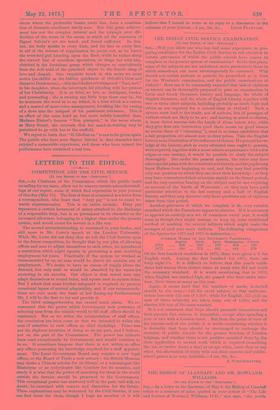[TO THE EDITOR OF THE "SPIOTATOR.1
SIIL—As Chairman of the Commission which the public insist on calling by myname, allow me to remove certain misunderstand-
ings of our report, some of which find expression in your journal of this day (May 15). The first of these is contained in a letter from a correspondent, who fears that "duty pay" is not to count to- wards superannuation. This is an entire mistake. Duty pay represents a certain increment of salary attached to the discharge of a responsible duty, but is as permanent in its character as the increased allowance belonging to a higher class under the present system, and would count for service in a like way.
The second misunderstanding is contained in your leader, and still more in Mr. Lowe's speech at the London University. While Mr. Lowe did not deny that we left the Civil Service open to the freest competition, he thought that by our plan of allowing offices and men to adjust themselves to each other, we introduced a restriction which might operate in preventing a man receiving employment for years. Practically, if the system be worked as recommended by us, no man would be above six months out of employment. We desire to have an excess of supply above the demand, but only such as would be absorbed by the vacancies occurring in six months. Our object is that round men may adapt themselves to round holes, and square men to square holes. But I admit that some further safeguard is required to prevent occasional lapses of mutual adaptability, and if our recommenda- tions are ever made the basis of law during my Parliamentary life, I will be the first to try and provide it.
The third misapprehension has caused much alarm. We re- commend that the power which Government now possesses of selecting men from the outside world to fill staff offices should be continued. But as we widen the interpretation of staff offices, the conclusion has been come to that we intended to widen the area of selection to such offices as chief clerkships. There was not the slightest intention of doing so on my part, and I believe, not on the part of the Commission. The power has hitherto been used exceptionally by Government, and would continue to be so. It sometimes happens that there is not within an office any officer possessing the knowledge required for a staff appoint- ment. The Local Government Board may require a new legal officer, or the Board of Trade a new actuary; the British Museum may desire a Chinese scholar for its library, or a mineralogist like Maskelyne or an icthyologist like Gunther for its museum, and surely it is wise that the power of searching for them in the world outside the Service should be preserved to the Government. This exceptional power has answered well in the past, and will, no doubt, be exercised with reserve and discretion for the future. These explanations may be welcomed by the Civil Service, if you can find room for them, though I hope no member of it will
believe that I intend to write or to reply to a discussion in the columns of your journaL—I am, Sir, &c., LYON PLAYFAIR.


































 Previous page
Previous page